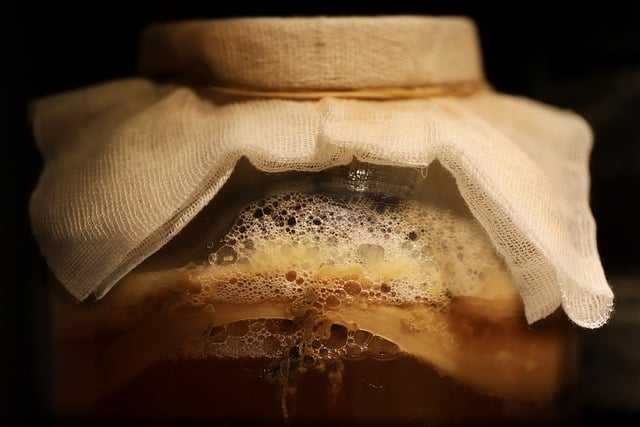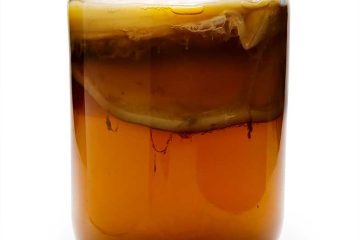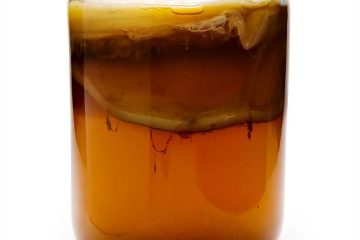kombucha tea has alcohol

Delve into the bubbly world of kombucha tea, where health meets a slight twist! While often touted for its probiotic benefits and tangy taste, did you know that kombucha tea holds a tiny secret? Yes, that’s right – there’s a whisper of alcohol lingering in those fizzy layers. Join us on a journey through the intriguing realm of kombucha tea as we uncover the nuanced relationship between this ancient elixir and its subtle alcoholic nature.
Table of Contents
- The Alcoholic Content in Kombucha Tea
- Tips for Monitoring Alcohol Levels in Homemade Kombucha
- Regulations and Guidelines for Commercial Kombucha Brands
- Ensuring Safe Consumption of Kombucha Tea
- Q&A
- Concluding Remarks

The Alcoholic Content in Kombucha Tea
Kombucha tea is renowned for its tangy flavor and potential health benefits, but did you know that it contains alcohol? This fermented drink, often hailed for its probiotic properties, undergoes a natural process that results in the production of trace amounts of alcohol.
While the alcohol content in kombucha tea is generally minimal, it’s essential for consumers to be aware of its presence, especially if they are sensitive to alcohol or following a strict alcohol-free lifestyle. The fermentation process, which involves the interaction of yeast and sugar, gives rise to alcohol as a natural byproduct, contributing to the unique composition of this popular fizzy beverage.

Tips for Monitoring Alcohol Levels in Homemade Kombucha
When it comes to homemade kombucha, it’s essential to keep an eye on the alcohol levels to ensure it stays within safe limits. Monitoring alcohol content in your fermented tea can be a crucial step in enjoying your kombucha without any unexpected surprises. Here are some helpful tips to help you keep track of alcohol levels in your homemade kombucha:
- Use a hydrometer: A hydrometer is a handy tool that can measure the specific gravity of your kombucha, indicating the alcohol content. It’s a simple yet effective method to monitor the fermentation process.
- Regular taste tests: While not the most precise method, tasting your kombucha regularly can give you a rough idea of its alcohol content. If it starts to taste too alcoholic, it might be time to adjust your brewing process.
Regulations and Guidelines for Commercial Kombucha Brands
In the world of commercial kombucha brands, navigating through regulations and guidelines can be as intricate as the fermentation process itself. **Ensuring compliance with industry standards is crucial to maintain the authenticity and quality of kombucha tea products.** Whether it’s monitoring alcohol content levels or labeling requirements, staying abreast of the regulatory landscape is paramount for brand success.Crafting a standout commercial kombucha brand involves a delicate balance of creativity and adherence to rules. From ingredient sourcing to production practices, each step must align with established regulations to cultivate consumer trust and loyalty. Embracing transparency and authenticity not only resonates with health-conscious consumers but also sets the foundation for long-term brand sustainability.
| Regulation | Guideline |
|---|---|
| Alcohol Content | Must be monitored and compliant with legal limits |
| Labeling | Accurate and informative tags are essential |
| Production | Follow standardized practices for consistency |

Ensuring Safe Consumption of Kombucha Tea
Kombucha tea, a popular fermented drink known for its probiotic benefits, may surprise some consumers with its alcohol content. While traditionally brewed kombucha contains trace amounts of alcohol resulting from the fermentation process, it’s essential for individuals, especially those sensitive to alcohol, to be aware of this fact. Here’s how you can ensure safe consumption of kombucha tea:- Check the Label: Look for information on the alcohol content of the kombucha product. Some brands may have higher alcohol levels due to extended fermentation.
- Understand Your Limits: If you are sensitive to alcohol or avoid it altogether, consider opting for non-alcoholic versions of kombucha that undergo additional steps to reduce alcohol content.
When enjoying kombucha tea, moderation and awareness are key to embracing its health benefits while ensuring a safe and enjoyable experience. Be mindful of the alcohol content, explore different brands that cater to your preferences, and savor the unique flavors of this ancient elixir.
Q&A
Q: Does kombucha tea contain alcohol?A: Yes, kombucha tea may contain trace amounts of alcohol due to the fermentation process involving yeast and sugar. The alcohol content is typically low, usually below 0.5% when commercially produced.
Q: Is it safe to drink kombucha tea if it contains alcohol?
A: For most people, consuming kombucha with low alcohol levels is safe. However, individuals sensitive to alcohol, pregnant women, or those with certain medical conditions should exercise caution or consult a healthcare provider before consuming kombucha.
Q: How can one determine the alcohol content in kombucha tea?
A: Some brands label the alcohol content on their kombucha bottles. Additionally, using a hydrometer or alcohol testing kit can help measure the alcohol levels at home if you have concerns about the content.
Q: Are there ways to reduce the alcohol content in kombucha tea?
A: Fermenting kombucha for a shorter period or storing it in the refrigerator can potentially reduce the alcohol content. However, altering the fermentation process may affect the flavor and probiotic content of the tea.
Q: What are the regulations regarding alcohol content in kombucha tea?
A: The alcohol content in kombucha is regulated in many countries. In the United States, for example, the Alcohol and Tobacco Tax and Trade Bureau (TTB) sets limits on the permissible alcohol content for kombucha labeled as non-alcoholic. It is essential for producers to comply with these regulations to ensure consumer safety and transparency.




0 Comments